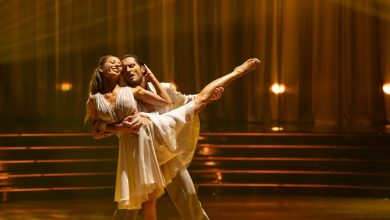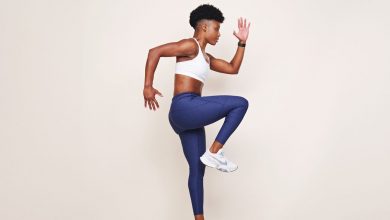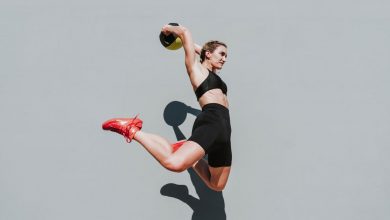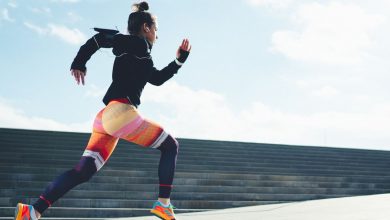Everything Simone Manuel Has Shared About Her Experience With Overtraining Syndrome
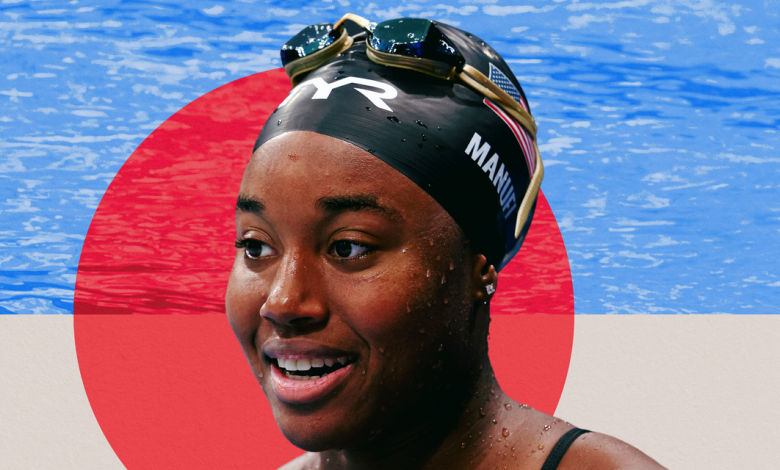
After the Rio Games in 2016, Simone Manuel was riding high: She took home four medals, and became the first Black female swimmer to win individual Olympic gold.
But in January of 2021, as she was training for her next Olympic Trials, she started feeling off. At first, it was just every week or so at practice. But by March, her symptoms worsened, as she shared in an emotional press conference at the Trials that year.
Her heart rate would spike during easy workouts and remained high even when she was at rest. Her muscles felt sore and she lost her appetite. “Just walking up the stairs to the pool, I was gassed,” she said. When she couldn’t even compete in all her events at the 2021 Pro Swim Series in San Antonio in March 2021, she went to the doctor and was diagnosed with overtraining syndrome.
Every athlete has likely pushed their boundaries and felt fatigued. But overtraining syndrome (OTS) is more than that; OTS is a serious medical condition in which your body doesn’t recover from, or adapt to, the training you’re doing, according to the Cleveland Clinic. In severe cases, it can mess with your parasympathetic nervous system, leaving your body physically unable to relax. Experts estimate that between seven and 20% of high-level athletes have signs or symptoms of OTS at any given time, according to a review in the journal Frontiers in Network Physiology.
Now, three years later, Manuel is back to competing—and winning medals. On July 28, she led the women’s team to its fastest-ever time in the 4×100-meter freestyle relay at the 2024 Olympic Games, winning silver in the process. And she’ll have another shot to bring home even more hardware in Paris on August 3, when she’ll line up for the 50-meter freestyle.
But the road from overtraining syndrome back to the top of competitive sport wasn’t easy. Here’s what she experienced as she made her way back to the pool.
Manuel’s symptoms weren’t just physical.
Overtraining syndrome also brings a host of psychological challenges. Manuel says she was depressed, anxious, and couldn’t sleep. She also lost her enthusiasm for the sport she loved, among other changes to her personality.
“I had moments where I didn’t even want to go to the pool because I knew it was going to be bad,” she said at the 2021 Trials. “I isolated myself from my family. My mom would ask me questions on the phone and I’d snap at her in ways that I typically wouldn’t.”
The stress of being a Black swimmer added to her struggles.
While Manuel knows that training too hard for too long contributed to her condition, she also recognizes the role mental stress played on top of it. When the Olympics were delayed a year due to the pandemic, that meant lots of time to train without a break. On top of that, the death of George Floyd brought not only trauma, but also a racial reckoning that forced her into the spotlight.
“I was then being asked to speak on these panels: ‘How can we support our Black community?’ ‘How can we diversify the sport of swimming?’” she said in a 2023 documentary produced by TOGETHXR.
“To be asked to continue to put my emotions on the line for other people to somehow be entertained by it—it was just a really tough time for me,” she said. “Because I was training so hard and never took a break, I think my body just ended up crashing.”
She wasn’t sure if she’d ever swim again.
When she explained all her symptoms to the doctor in 2021, he immediately knew what the problem was: “He just looked at me and goes, ‘You’re overtrained,’” Manuel said on the Unfiltered Waters podcast this April.
She modified her workouts for several weeks, but her performance continued to decline. At that point, her doctor was frank: “‘If you continue to train right now, you might not ever swim again,’” Manuel said. “That’s just how poorly my body was functioning.”
So, she took three weeks off. As she told The Ringer, she’d get up, eat breakfast, then hunker down on the couch, where she’d sleep for another four to five hours. That short break wasn’t enough to fully recover, but it allowed her to compete at the Trials in 2021. There, she placed ninth in the 100-meter freestyle, not making it to the finals in the event where she won gold in Rio. Afterward, she revealed her diagnosis in an emotional press conference, then rallied to win the 50 freestyle, earning a spot on Team USA in Tokyo.
She had a hard time knowing what—and when—to share about her health.
About that press conference: Even though she knew she was entering the 2021 Trials at less than her best, Manuel hesitated to discuss what she’d gone through.
In part, she was holding out hope for a miracle—that despite how poorly she felt, she might still perform well. She also feared that people might not take her seriously, thinking she was scared of competition or making excuses, she said on Unfiltered Waters.
Some of her predictions proved true. “People didn’t believe that I actually was overtrained,” Manuel said in the TOGETHXR documentary. “People said that I was distracted by all my other sponsor obligations, and that’s why I didn’t perform well. That I became lazy and my success went to my head.”
Her treatment included five months of complete rest.
The Tokyo Olympics didn’t go as well as Manuel hoped; though she won bronze in the 4×100-meter freestyle relay, she didn’t make the final in the individual 50-meter freestyle. When she returned back home, she saw her doctor again. He asked her how much time off she thought she needed, and she said the rest of the year. So, that was her prescription—she didn’t train, or do any physical activity at all, until January.
“I wasn’t allowed to get my heart rate up at all—it was really about giving my body total rest so that it could just continue to try to recover and get healthy,” she said on Unfiltered Waters.
She (and her doctors) still weren’t sure if she’d ever be able to perform at the level she had before. Once an athlete has had OTS once, their risk of tipping into it again increases, they told her.
Patience and self-compassion were also key to her recovery.
After Tokyo, Manuel heard even more “negative noise” about her performance. “The only way I knew how to pick myself back up was to be proud of what I’ve done, and that’s typically something that I don’t do,” she said on Unfiltered Waters. She took time to acknowledge the difficulties she’d been through that year, but also her value as a daughter, friend, teammate, and person. Seeing a sports psychologist helped, as did journaling or “word dumping,” as she described it to The Ringer.
She’s also leaned on her support system. In addition to her parents, who have always stood by her, she married her husband Denzel Franklin in 2022. “I think what has helped in being in the relationship is knowing that my priority isn’t just swimming; he also is my priority as well,” she said on Unfiltered Waters. “That allows me to in some ways balance swimming better.”
She eased back into training little by little.
In order to help hang onto that new mindset, Manual changed up her environment and moved to Arizona to train with a pro group coached by Arizona State’s Bob Bowman. There, she found coaches and teammates who helped her have fun and appreciate each small step forward.
Her workouts started with just 15 minutes of continual swimming; she gradually stretched that out to 30, The Ringer reports. The goal was to eventually get her up to the hour mark, but Bowman was careful not to rush it.
It took two years of training for her to feel like herself again.
Manuel’s first competition back was January of 2022. But it wasn’t until the US Open in December 2023, where she broke 54 seconds in the 100 freestyle again, that she felt she was getting closer to her previous level.
On Unfiltered Waters, she called the performance a “breakthrough.” “It was the first time in a while that I felt confident racing,” she said.
She carried that feeling through the 2024 Trials. Although she again failed to qualify in the 100-meter freestyle, she earned her spot on the 4×100 freestyle relay team and repeated her victory at the 50-meter freestyle.
She doesn’t necessarily call Paris a comeback.
Yes, she’s returning to the Olympic Games in a far better place, mentally and physically. But when Unfiltered Water hosts Katie Hoff and Missy Franklin, fellow Olympic medalists in swimming, asked her for a word to describe her current motivation, Manuel said she prefers one her mom gave her: Unfinished.
“It speaks definitely to the swimming goals I have, but also just me as a person,” she said. “There’s always more to do, there’s always more to accomplish and work on and we won’t be finished until it’s our time.”
SELF is your one-click source for all things Summer Olympics. Read our latest coverage of the Paris Games here.
Related:
- The Sweet Reason Track Star Sha’Carri Richardson Does Her Nails
- Everything Katie Ledecky Has Shared About Living With the Health Condition POTS
- Everything Suni Lee Has Shared About Her Rare Kidney Disease
Get more of SELF’s great sports coverage delivered right to your inbox—for free.
